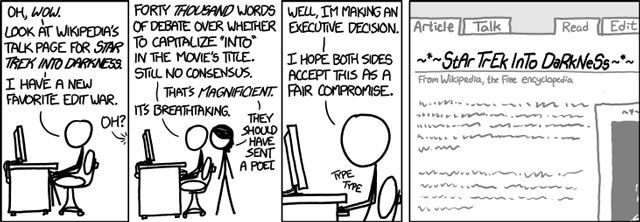Internet comments show the worst side of humanity. If you dare to venture an opinion that differs from someone else's online, you can expect to be called any of several dozen words I can't put here. Suffice to say, you can expect to be accused of improbable acts with an array of family members, animals and inanimate objects for simply expressing an opinion that another commenter doesn't agree with.
Why are flamewars so common on today's web, and is it really a new phenomenon? It seems like if Dante wrote Inferno today, there'd be a tenth circle reserved for anyone who comments on YouTube videos.
Personal insults are — sadly — the norm online, even outside of the various "-gates". Publish something and you can be pretty sure that someone will take issue and express it with four-letter adjectives and typos. Even a site like MakeUseOf – which usually has excellent comments – isn't safe from flamewars. Our own Ben Stegner kicked off something special with his Goodbye to Windows Phone article.
My own article on Why Microsoft is Awesome had a similar response. It's at the stage where if I'm not called a corporate shill after I write an article, I wonder where I went wrong.
Tyson-gate
Just last week, the physicist Neil deGrasse Tyson managed to infuriate people with his tongue-in-cheek tweets about Christmas. Republican Representative Steve Smith shot back a rejoinder that led to him being called many unpublishable things.
While Tyson's jokes certainly didn't warrant the expletive laden responses they occasionally got, Rep. Smith is unlikely to be capable of the anatomically improbable things he was accused of doing. As always with a flamewar, no one who weighed in came away looking good.
Fire, Brimstone and YouTube
YouTube comments are widely regarded as the worst of the worst. Scan the comments of any video and you'll see bigotry in every one of its guises. If something can be described as an "-ism", you'll find it in most YouTube video's comments. There is nothing so inoffensive that it can't start a flamewar on YouTube.
A British comedy troupe has started reconstructing especially stupid YouTube arguments. This argument between two One Direction fans is one of my favourites. Warning, NSFW language from the start.
Wikipedia Woes
Wikipedia's Talk pages — the comments area for editors to discuss changes — are rife with flamewars. While it's immediately obvious that contentious figures like Barack Obama would lead to "interesting" discussions amongst Wikipedia's many editors, other less-divisive topics have triggered ridiculous arguments.
The Talk page for Star Trek Into Darkness has a 40,000 word debate (and I use that word extremely loosely) over whether the correct title for the article should be Star Trek Into Darkness or Star Trek into Darkness. I don't think so much passion has ever been devoted to the capitalisation — or lack thereof — of a single character in a preposition. Tempers flared and lit a flamewar.
Ignition Sources
So what is it that leads to a flamewar? Okay, religion and politics are contentious issues. It's no surprise that people get passionate about their god or political party. But why will people devote their time and energy to bashing someone who uses a different operating system? Or disagrees over whether into should be capitalised or not?
Fundamentally it comes down to how the Internet removes much of the framework of traditional face-to-face communication. Psychologist John Suler has investigated the online disinhibition effect. He's identified six factors that lead to people saying and doing things online that they never would offline. These are the root causes of flamewars.
The Six Flamin' Factors
Dissociative Anonymity
Online no one knows you're a dog… or a doctor, an accountant or anything else. When you can dissociate what you do online from what you do in real life, it's much easier to act out and do things you otherwise wouldn't. Your online identity doesn't effect your offline one.
Gawker unmasked Violentacrez, a "notorious Internet troll" as a middle-aged married man who worked for a Texas financial services company. Violentacrez, who was responsible for some truly reprehensible online activities, was — in his offline life — a seemingly regular guy. The anonymity of the Internet, and it's separation from his day-to-day life, gave him the freedom to act out.
Invisibility
Invisibility is related to anonymity but subtly different. Even when you are communicating with someone you know online they still can't see you — and nor can you see them. The effect is twofold: not only do people do things they otherwise wouldn't because they aren't being directly observed, but they also miss social cues that would stop them otherwise.
It is easier to have empathy for another person when you can see the pain in their eyes than when they are just another user name.
Asynchronicity
In face-to-face communication responses are immediate. Online they can take minutes, days, weeks or even months. According to Suler, this removal of immediate reactions disinhibits people. While in some cases it can allow people to reach more logical conclusions by thinking about an issue further, in others it can lead them to "toxic inhibition".
Solipsistic Introjection
The removal of face-to-face cues combined with text-communication can alter how you perceive someone else. Rather than as a distinct person, self-boundaries can blur and another person can be seen as a part of your own psyche. While this is a fairly philosophical point, it does make sense if you think about it.
Most people routinely carry out fantasy arguments in their own mind, where they say and do things that they'd never actually act on. By reducing another person to words on a screen, fantasised over-the-top responses become possible in a way they would not in person.
Dissociative Imagination
Suler writes that by combining the dissociative nature of online communication along with the seemingly imaginary nature of other people online it's possible that — consciously or unconsciously — you can begin to see online characters existing in a different space distinct from the real world. Again, the separation of real life from online life disinhibits people and they act in ways they otherwise wouldn't.
Minimisation of Status and Authority
Online there is no authority. While in day-to-day life authority figures are apparent through dress, body-language and situational cues, online anyone can claim to be anything they want.
Fear of disapproval and punishment is one of the many things that keeps people from doing anti-social things offline. With no authorities online that fear disappears. Well moderated forums are generally safe from flamewars. Truly open arenas like YouTube, Twitter and Reddit aren't.
It Was Always Burning
The Internet didn't start the flamewars: as long as discourse has been around, there's been uncivil discourse. John Adams famously described Benjamin Franklin's whole life as "one continued insult to good manners and decency" and George Washington as "too illiterate, unlearned, unread for his station". Similar to Internet flamewars, most of it happened in writing — either to a newspaper or in a letter — rather than face to face. It's interesting to consider how similar letter writing is to online communications, and how Suler's six factors could also be applied to it.
Authors are also renown for their sharp critiques of fellow writers. William Faulkner dismissed Ernest Hemingway saying "He has never been known to use a word that might send a reader to the dictionary." Hemingway responded, "Poor Faulkner. Does he really think big emotions come from big words?"
While these examples may be a little more eloquent than your average YouTube comment, the underlying emotions and reactions are the same. A disagreement over political opinion in the 1700s was as likely to degenerate into insults as one in the 2000s. Unless someone finds a way around the online disinhibition effect, it'll probably be the same in the 2300s.
What about you? Massively disagree with this article? Maybe I'm an idiot who makes Hitler look like Mother Teresa. Why not tell me in the comments?





